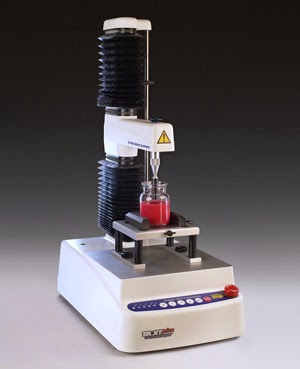 Two versions of the KRAMER SHEAR CELL (HDP/KS10 and HDP/KS5) are available.
Two versions of the KRAMER SHEAR CELL (HDP/KS10 and HDP/KS5) are available. The 10-bladed HDP/KS10 must be used with a 50Kg loadcell or greater.
The 5-bladed HDP/KS5 can be used with a 25Kg or 30Kg loadcell for soft products, but a 50Kg loadcell or greater is recommended.
Easy locating adapters ensure fast blade removal for cleaning and replacement or further testing. Cells have perspex front panels for precise positioning of the blades close to the sample, and easy removal for cell cleaning.
The cell is used for analysing multi-particle products such as cereals and pickles in sauce together with fruit and vegetables. This test applies a combination of compression, shearing and extrusion.
*Attachments with code prefix HDP/ must be used in conjunction with HDP/90 Heavy Duty Platform.


|
| Measurement of firmness of reformed ham using the Kramer Shear Cell; comparison of formed and reformed ham samples |
Some more information on this fixture:
Canned Ham –
Multiple Shearing
The sample to be sheared is often variable in configuration or structure. The result is an average of the forces required to cut through the sample of variable geometry.
This device lends itself ideally to reformed products such as tinned hams, meat pieces (such as fillet strips or chunks) and shaped (and usually breaded) poultry products e.g. chicken nuggets.
The right-hand graph shows typical texture analysis curves comparing a multiple shearing test on two samples of commercially available canned ham products: one sample was purchased as a ‘cooked lean formed ham’, which maintained much of its initial meat fibre integrity, whilst the other was a ‘premium reformed ham’, consisting mainly of meat chunks bound together.
Both were removed from their cans, covered and held at a temperature of 5°C prior to testing. Samples were cut to optimum dimensions and placed separately and centrally into the Kramer Shear cell. The set of 5 blades were attached to a 100kg load cell and their position had been adjusted to avoid frictional effects with the cell when moving down into it. A multiple cutting/shearing test was then performed on a TA.HDplus texture analyser.
The results showed that the formed ham required the largest force to shear compared to the preformed ‘mainly chunks’ ham. This is probably due to the loss of meat integrity of the preformed sample and indicates that the force to shear through the meat fibres of the formed sample is greater than to shear and separate a sample consisting of bound together meat chunks.
We can design and manufacture probes or fixtures for the TA.XTplus texture analyser that are bespoke to your sample and its specific measurement.
Once your measurement is performed, our expertise in its graphical interpretation is unparalleled. Not only can we develop the most suitable and accurate method for the testing of your sample, but we can also prepare analysis procedures that obtain the desired parameters from your curve and drop them into a spreadsheet or report designed around your requirements.
For more information on how to measure texture, please visit the Texture Analysis Properties section on our website.
 The TA.XTplus texture analyser is part of a family of texture analysis instruments and equipment from Stable Micro Systems. An extensive portfolio of specialist attachments is
available to measure and analyse the textural properties of a huge range of
food products. Our technical experts
can also custom design instrument fixtures according to individual
specifications.
The TA.XTplus texture analyser is part of a family of texture analysis instruments and equipment from Stable Micro Systems. An extensive portfolio of specialist attachments is
available to measure and analyse the textural properties of a huge range of
food products. Our technical experts
can also custom design instrument fixtures according to individual
specifications.No-one understands texture analysis like we do!
To discuss your specific test requirements click here...
 |  |  |

No comments:
Post a Comment